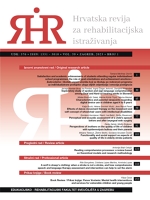Zadovoljstvo i školski uspjeh učenika koji se školuju po redovnom programu uz individualizirane postupke: uloga ciljnih orijentacija i emocija postignuća
Satisfaction and academic achievements of students attending regular individualised school programmes: the role of goal orientations and achievement emotions
Author(s): Tamara Martinac DorčićSubject(s): Education, School education, Educational Psychology, State/Government and Education, Inclusive Education / Inclusion
Published by: Sveučilište u Zagrebu, Edukacijsko-rehabilitacijski fakultet
Keywords: students attending regular individualised school programme; achievement goal orientations; achievement emotions; satisfaction; academic achievement;
Summary/Abstract: The aim of this study was to examine whether achievement goal orientations, agency beliefs, achievement emotions, aspects of satisfaction, and academic achievements differ between students attending the regular individualised school programmes and those attending the regular programme, as well as to determine the contribution of motivational and emotional factors in explaining satisfaction and academic achievements of students attending the regular individualised school programme. The sample comprised of 417 students enrolled in a regular individualised school programme (27.1% girls) and a comparison group of 448 students enrolled in a regular programme (27.9% girls). The comparison group of students was selected from a random sample using the random number method, while taking grade (seventh and eighth grades of primary school, and first and second grades of secondary school) and gender into account. The students completed a Goal Orientation Questionnaire, the Agency Beliefs Scale, and an Achievement Emotions Questionnaire, assessed their satisfaction with life, with themselves as students, and with their relationships with other students, as well as provided information about their academic achievements. The results of a two-way analysis of variance indicate that students attending the regular individualised school programme have lower mastery extrinsic orientation, tend to underestimate their ability to be successful in school, and record lower academic achievements, as well as lower satisfaction with life, with themselves as students, and with their relationships with other students. The findings of the hierarchical regression analyses demonstrate that goal orientations, agency beliefs, and achievement emotions explain satisfaction with oneself as a student to a larger extent than academic achievements. In this regard, goal orientations have proved to be more significant for academic achievement (mastery-intrinsic and mastery-extrinsic orientation, work avoidance), while agency beliefs (effort assessment) are more significant for satisfaction with oneself as a student.
Journal: Hrvatska revija za rehabilitacijska istrazivanja
- Issue Year: 59/2023
- Issue No: 1
- Page Range: 1-29
- Page Count: 29
- Language: English, Croatian

